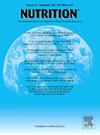Effects of menstrual symptoms on dietary intake frequency
IF 3.2
3区 医学
Q2 NUTRITION & DIETETICS
引用次数: 0
Abstract
Introduction and Objective
The symptoms that are seen due to changes in hormone levels during menstruation may lead to changes in the dietary intake frequency and eating behaviors of women. This study was conducted to determine the effects of menstrual symptoms on changes in the dietary intake frequency of women.
Method
The data of this descriptive study were collected between May and June 2024 from 393 women aged 18–45 who had regular menstruation and were selected by snowball sampling using an online survey. A Descriptive Information Form, the Menstrual Symptoms Questionnaire and the Nutrition Consumption Frequency Change Scale of Change were used to collect data. Descriptive statistics, paired-samples t-tests, and multiple regression analysis were used to analyze the data.
Results
The participants had significantly higher dietary intake levels of traditional beverages and dietary supplements during menstruation in comparison to before menstruation (P < 0.001). Menstrual symptoms were identified as factors that significantly affected the intake of traditional beverages and dietary supplements by the participants, as well as their overall dietary intake.
Conclusion
Menstrual symptoms of women significantly affected their intake of traditional beverages, intake of dietary supplements, and general dietary intake during menstruation.
月经症状对饮食摄入频率的影响
前言与目的月经期间激素水平的变化所引起的症状可能导致女性饮食摄入频率和饮食行为的改变。本研究旨在确定月经症状对女性饮食摄入频率变化的影响。方法采用滚雪球抽样在线调查的方法,于2024年5月至6月对393名18-45岁月经规律的女性进行描述性研究。采用描述性信息表、月经症状问卷和营养消费频次变化量表收集数据。采用描述性统计、配对样本t检验和多元回归分析对数据进行分析。结果与月经前相比,参与者在月经期间的传统饮料和膳食补充剂的膳食摄入量显著增加(P <;0.001)。月经症状被确定为显著影响参与者传统饮料和膳食补充剂摄入量及其总体膳食摄入量的因素。结论女性经期症状对传统饮料摄入、膳食补充剂摄入及一般膳食摄入均有显著影响。
本文章由计算机程序翻译,如有差异,请以英文原文为准。
求助全文
约1分钟内获得全文
求助全文
来源期刊

Nutrition
医学-营养学
CiteScore
7.80
自引率
2.30%
发文量
300
审稿时长
60 days
期刊介绍:
Nutrition has an open access mirror journal Nutrition: X, sharing the same aims and scope, editorial team, submission system and rigorous peer review.
Founded by Michael M. Meguid in the early 1980''s, Nutrition presents advances in nutrition research and science, informs its readers on new and advancing technologies and data in clinical nutrition practice, encourages the application of outcomes research and meta-analyses to problems in patient-related nutrition; and seeks to help clarify and set the research, policy and practice agenda for nutrition science to enhance human well-being in the years ahead.
 求助内容:
求助内容: 应助结果提醒方式:
应助结果提醒方式:


